Tonk
| Author:Laxman Burdak, IFS (Retd.), Jaipur |
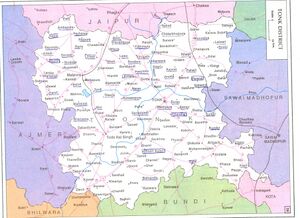
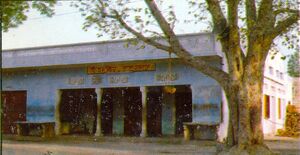
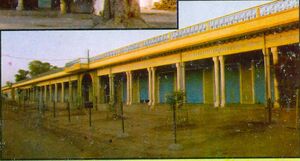
Tonk (टोंक) is a city and district in Rajasthan. Its ancient name was Tonkra (टोंकड़ा).
Location
It is situated on National Highway No. 12 at distance of 100 kms from Jaipur. It is located in North- Eastern part of the state between 75.19' & 76.16 East longitude and 25.41' and 26.24' North Latitude. It was founded by Jats of gotra Tonk.
Tahsils in Tonk district
Villages in Tonk tahsil
Ahamadpura Chauki, Ahmadganj, Ahmadnagar, Ahmadpura, Ahmadpura Chouki, Alimpura, Alipura, Allapura, Allapura Chandola, Aminpura, Amirpura Khera, Arniya Ghati, Arniya Neel, Arniya Tiwari, Arniya Kedar, Arniya Mal, Balapura, Bamor, Bara Abdullapura, Baroni, Bhanchi, Bhanwar Kho, Bharni Tonk, Bichpuri Tonk, Bishnpura, Bithola, Borda, Bordi, Chandlai, Chhan, Chiroj, Chooriya, Deoganj, Dakhiya, Darda Hind, Deobarniyan, Deoli, Deopura, Farookabad, Ghas, Ghasri, Goharpura, Gulabpura, Hakeempur, Hanifpur, Harchandera, Hatauna, Hayatpura, Ilahipura, Isarda, Islampura, Jamanpura, Jhalra, Jhirana, Kabra, Kareeriya, Karimpura, Karola, Khajooriya, Khaleel Pura Papra, Khaleelabad, Khanpura, Khera Meer Saman, Lahan, Lamba, Latifganj, Lawadar, Laxmipura, Mahmoodganj, Mahuwa, Maliyon Ki Jhonpariyan, Mandawar, Meerganj Sherpur, Meernagar, Mehandwas, Mohammad Nagar, Mohammadpura Withnayagaon, Mohammd Ganj Jageer, Mohmmad Nagar, Motooka, Nawabpura, Nimola, Nimola, Nirwana, Noorpur Khera, Palra, Palri, Parana, Pharasya, Raghunathpura, Rahimpura, Rahmandiya, Rajnagar, Ranipura, Rasoolapura, Raufpura Khera, Rhimpura, Sadagaon, Sandila, Sankhana, Sardarpura, Saulatpura, Thikariya, Shyopuri, Sitarampura, Sonwa, Soran, Sunela ( Hazipura), Takholi, Talibpura, Thada, Thali, Theekariya, Tonk (M CI), Um, Untitana, Usmanpura, Usmanpura, Wazeer Nagar, Wazeerabad, Wazeerpura Kalan, Wazeerpura Khurd, Yakoob Ganj, Yusufganj @ Ramnagar, Yusufpura @ Charai,
जाटों के तीन वर्ग(तड़)
टोंक व कुछ जयपुर जिले का जाट समाज तीन वर्गों में बँटा हुआ है:- (1) आँजणा (आनणा)(350+ गोत्र)2) धौल्या(44 गोत्र) (3) झोझा(14-15 गोत्र), इन तीनो वर्गों में आपस में विवाह नहीं होता, इन तीनो वर्गों में जितने भी गोत्र आते है वे केवल अपने वर्ग में ही विवाह करते हैं।यह तड़ व्यवस्था कहाँ से शुरू हुई कुछ पता नही लेकिन इसने यहाँ के जाट समाज को तोड़ने का काम काफ़ी अच्छे से किया है और आपसी बैर को बढ़ाया ही है यह वर्ग एक दूसरे को हेय दृष्टि से देखते है और आपस में रोटी बेटी का कोई व्यवहार नही रखते।परंतु इनके गाँव में मिलने वाले गोत्रों से अंदाज़ा लगाया जा सकता है की आनना तड़ के ज़्यादातर गोत्र वे है ज्यों मारवाड़ से आकार यहाँ बसे है और धौल्या तड़ में सिर्फ़ धोलिया गोत्र को छोड़कर बाक़ी सभी गोत्र दिल्ली और उसके आसपास के क्षेत्र से है ।झोझा तड़ के गोत्र दिल्ली,पंजाब,UP के है परंतु इनके लिए कहाँ जाता है कि यह लोग टोंक में मेवाड़ से आकार बसे है और किसी कारण से इन्होंने मेवाड़ छोड़ दिया था ।जाट महासभा डिग्गी द्वारा कई बार यह भरसक प्रयास किया गया की समाज में एकता स्थापित हो परंतु यह एकता केवल वहाँ के मंच तक ही सीमित रह गयी ।सबसे अचम्भे की बात तो यह है की आज का पढ़ा लिखा युवा वर्ग भी इस कुरीति को मानने से गुरेज़ नही करता और प्रायः देखा जाता है की इन वर्गों से जोड़कर देखने पर वे खुद को गौरवान्वित महसूस करते है ।समाज के पढ़े लिखे बुद्धिजीवी लोग द्वारा इस कुरीति को ख़त्म करने के लिए कोई ठोस प्रयास नही किया गया है ।आप पूरे राजस्थान में कही भी चले जाय और किसी भी जाट से पूछेंगे की “आप कौनसे जाट है “ तो वे सीधा अपना गोत्र बताएँगे लेकिन जयपुर टोंक में वे अपने वर्ग का नाम सबसे पहले बाद में अपना गोत्र बताएँगे ।राजनीतिक रूप से आनना तड़ सबसे अधिक वर्चस्व रखती है और फिर झोझा बाक़ी धौलिया तड़ का राजनीतिक रूप से कोई अस्तित्व नही हैं।
History
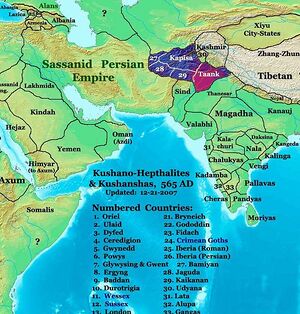
According to Dr Naval Viyogi, Rajasthan was sometimes the greatest centre of naga ruler. Present Tonk town was centre of naga rulers and is called in the Chauhan Chronicles Takatpur after the name of Takshak Naga.[1][2]
In popular Parlance, the Tank - Sarohas are mentioned together like 'Dahiya-Dabas' and 'Siddhu - Brar' combination). The Cities of Tonk, Sirohi are named after them. At one time, the entire Punjab was called Tank Desa. The reports of The Chinese pilgrims confirm this fact. Originally they were worshippers of the Snake-Garlanded form of Shiva. Hence they were called Nagas also. [3] [4] Tonk district had many Jat rulers in the past. Thakur Deshraj has mentioned about Jat rulers of following clans in his book Jat Itihas.
Khoja clan rule
Khoja Jats ruled in Tonk in 11th century. The author of ‘Tarikh Rajgan Hind’ Maulvi Hakeem Majmulgani Khan has mentioned about Tonk giving its geographical description and location of Tonk town on Banas River. He has further mentioned that Khoja Ram Singh after a war at Delhi came to this place and founded Tonkra (टोंकरा) town on magha sudi teras samvat 1003 (847 AD) . After a long period on magh sudi 5 samvat 1337 (1281 AD) when Ghiyas ud din Balban won Madhaupur and Chittorgarh, this town was again inhabited and called as Tonk. Thus the descendants of Ram Singh ruled Tonk from samvat 1003 to samvat 1337 (847-1281 AD). Ghiyas ud din Balban (1266–1286), ex-slave, son-in-law of Sultan Nasir ud din Mahmud had destroyed this town, which was rehabilitated.[5]
From Tonkra village of the old Sirohi State we have an inscription of a certain Vijad, dated in the (Vikrama) year 1232.
Chandla Jat ruler
Chandlai is a village in Tonk district of Rajasthan, India. It is situated at a distance of 10 km from Tonk city on Tonk – Kota road. A Jat chieftain ‘Chandla’ founded it. He got constructed a pucca pond near the village in the name of her daughter ‘Bhala’ and put an inscription on it on baisakh sudi 15 samvat 1027 (970 AD). This was the time when Rajasthan was ruled by a large number of small republics. Chandla was ruler of Tonk at that time.
Pirana Jat Janapada
Pirana is the name of a place at a distance of 8 km from Tonk city in north direction in Tonk district. It was a well organised republic state of Jats in earlier times. They used to collect taxes from traders and rich travelers passing through their state boundaries. They used to collect one fourth of the goods as tax. There was a system of equal right of all the brothers and castes on the land under their occupation. But in return they used to select 9 soldiers from their people for war. Every child, youth and elderly persons were committed to protect the state and sacrifice their lives.
Once a caravan of Begums of emperor Jahangir happened to pass through their state. Jat chieftain stopped the carvan and allowed to pass only when they paid taxes. Jahangir when came to know about this incident he sent his subedar Malook Khan to suppress these Jats. Malook khan knew the powers and strategy of Jat rulers so he did not attack them directly. He camped at a village called Sherpur near Ranthambore and started his planning. He allured one Doom and asked details about how he could defeat these Jat rulers. The Doom told him that on bhadwa badi 12 the Jats celebrate ‘Bachchh baras’ when all are armless. Malook khan attacked on this very date when the Jats were celebrating ‘Bachchh baras’. Jats being unarmed, many of them were killed. This way a Jat republic was destroyed.
Jiwan Singh and Raimal in Pirana were two chieftains who were killed in above attack. The pregnant ladies at the time of above attack got escaped and sent to Sanganer where they founded a town near Sanganer. The boys on their birth were named Jiwan and Raimal as decided prior to war on the name of above warriors killed. Jiwan later chose to live at a place of his ancestors and founded a new village ‘Pirana’ in the name of old village of same name. Some ladies were killed or chose to become sati after the death their husbands. There are terraces constructed in the memory of these ladies at Pirana locally known as ‘Satiyon ke chabutre’. The inscriptions on this site bear years upto samvat 1478 (1421 AD). These inscriptions indicate the period of war of Malook khan with Jats was in fourteenth century when Khilji was ruler at Delhi.
Jaipur's King Man Singh conquered Tari & Tokra Janpad in the regime of Akbar. In 1643 twelve village of Tokra janpad given to Bhola Brahmin . Later Bhola gave a name to these twelve villages as 'Tonk '. It is surrounded by 5 districts i.e. in north Jaipur, in South Bundi & Bhilwara, in East Ajmer and in West Sawaimadhopur districts. Average rain fall is 62 mm. Agriculture and animal husbandry are the main occupation of the people.
The history of Tonk is very old as it is connected with Bairath culture & civilization . Tonk has been called Rajasthan ka Lucknow, Adab ka Gulshan, Romantic poet Akhtar Shreerani ki Nagri, Meethe Kharboojo ka Chaman, Hindu Muslim Ekta ka Maskan and as result of which Tonk could keep an isolated status in Rajasthan. During the regime of Nawabs(1817 to 1974) , all the native were invited in a islamic function of Miladdunabi without caste, color and greed , which was organised by the ruling Nawabs for the period of seven days in the month of Rabiul Awwal ,collectively with all zeal in Tonk.It is further important to mention here that the first founder ruler of Tonk was Nawab Mohammed Amir Khan(Year 1824).
It is known as SAMWAD LAKSHYA in Mahabharat period. In the regime of Mouryas, it is under mouryas then it was merged in to Malvas. Most of the part was under Harsh Vardhan. As per HEVAN SANG, tourist of China, it was under Bairath State. In the regime of Rajputs, the parts of this state are under Chavras, Solankis, Kachvahs, Sisodiyas and Chouhans. Later, it was under the regime of King Holkar and Sindhia.
In 1806, Amir Khan conqurred it from Balvant Rao Holkar. Later, British government gained it from Amir Khan. As per the treaty of 1817, british government returned it to Amir Khan. In 1950 this Nawab state was formed as the District in Rajasthan state. The culture of Tonk is resembelance of Bairath culture and civilization.All festivals commonly are celebrate by the people irrespective of Caste. This district is an example fraternity and Hindu - Muslim unity.
Jat Dharmshala Sewa Samiti Diggi
Main article: Jat Samaj Dharmshala Diggi
Diggipuri is a very sacred place in the region. On every ekadashi and purnima thousands of people come for the darshan of Sri Kalyanji here. All castes have their own dharmshalas except Jat community. On 28-4-1991 the members of Jat community gathered to decide the formation of Jat Dharmshala Samiti to be chaired by Ladu Ram Chaudhary Diggi, Kishan Lal Deshama as Mantri and Sita Ram Chaupda as treasurer.
The Jat Dharmshala Samiti collected contribution from the community members of Malpura tahsil and constructed 16 rooms, a sabha bhawan, Shiva Mandir etc. They called a grand meeting of the community members and founded the Shiva Temple on 6 February 1993. This meeting was attended by Jagdip Dhankad, Gyan Prakash Pilania, Rupa Ram Murawatia, Prof. Sanwar Lal and others.
The Jat Dharmshala Samiti collected a contribution of about Rs. 1 Crore from Jat community members over a period of 7 years from 1992 to 1998. They constructed a new Dharmshala, a School with 64 rooms, a grand dinning hall, 12 bathrooms, 10 latrines, tube wells etc here at Diggi.
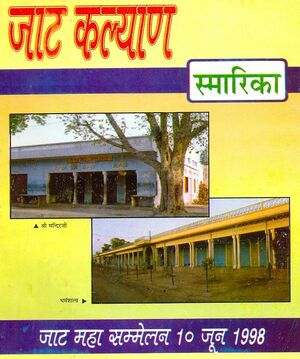
The Jat Dharmshala Samiti organized a grand Jat sammellan on 10 June 1998 and published a smarika 'Jat Kalyan Smarika' on this occasion. This smarika has a list of 4425 members of Jat community from 455 Jat Gotras and about 280 villages of tahsils Malpura, Tonk, Todaraisingh and Niwai in Tonk district. The 210 gotra names are new gotras not yet recorded in Jatland Wiki with any information about them. These new gotras are written with hindi name in bracket. This list has contribution of members from Jaipur district also. This list has also mentioned Jat Gotras of the contributors and as such is a useful document for the study and distribution of Jat gotras in Tonk district as highlighted below.
Jat villages in Tonk district
Tahsil Tonk and Piplu
Ajampura (आज़मपुरा), Alimpura (अलीमपुरा), Alinagar (अलीनगर), Amlaiya (अमलाईया), Anwarpura Kheda (अनवरपुरा खेड़ा) Araniya Kedar (अरनिया केदार), Araniya Maal (अरनिया माल), Aranya Kankad (अरण्या कांकड़), Babdi Darda (बाबड़ी डारडा), Bada Moja (बड़ा मोजा), Bagadi (बगड़ी), Bagadwa (बगड़वा), Bajya ka Mauja - Parana (बाज्या का मौजा - पराना), Balapura (बालापुरा), Bambor (बम्बोर), Bawdi (बावड़ी), Beelwasya (बीलवास्या ), Bhurakakad (भूराकाकड़), Bhurali (भूराली), Bijalpura (बीजलपुरा), Booriyon ka Kheda (बूरियों का खेड़ा), Bordi (बोरडी), Chaugai (चौगाई), Chheepi Pura (छीपी पुरा), Chhota Moja (छोटा मोजा), Chironj (चिरोंज), Devpura Piplu (देवपुरा पीपलू), Devpura (देवपुरा), Devri Goluda (देवरी गोलउदा), Dhikolia (ढिकोलिया), Dhundiya (ढुन्डिया), Dodwadi (डोड़वाड़ी), Doosri (डूसरी), Dotana (दोताना), Farasya (फरास्या), Gata (गता), Goharpura (गोहरपुरा), Golhad (गोलहद), Gordhanpura Lawa (गोरधनपुरा लावा), Gunpura (गुनपुरा), Hadigaon Badi (हाड़ीगाँव बड़ी), Hadigaon Kala (हाड़ीगाँव कला ), Hajipura (हाजीपुरा), Haneempur (हनीमपुर), Hanotia Naner (हनोतिया नानेर), Ibrahimpura Nimeda (इब्राहिमपुर नीमेडा), Imamnagar (इमामनगर), Islampur Soran (इस्लामपुर सोरन), Janka (जानका), Jaula (जौला), Jharana (झराना) Jyanki Balbhpura (ज्यानकी बल्भपुरा), Kacholya (कचोल्या), Kalyanpura Bagdi (कल्याणपुरा बगड़ी), Kalyanpura Bonrkhandi (कल्याणपुरा बोंरखण्डी), Karimpura Jonla (करीमपुर जोंला), Kashipura (काशीपुरा), Kathmana (कठमाणा), Khadkhada (खड़खड़ा), Khakhan ka Jhumpada (खाखण का झूम्पड़ा), Khedanurpura (खेड़ानूरपुरा), Khureda Pasrotya (खुरेड़ा पसरोटया), Khuredi (खुरेड़ी), Loharwada (लोहरवाड़ा), Maindwas (मैन्दवास), Mamana (ममाणा), Manasya Tiba (मनस्या टीबा), Mauja Jharana (मौजा झराना), Mohanabad (मोहनाबाद), Movani (मोवणी), Mungoda (मूंगोदा), Naaner (नानेर), Naya Dhila (नया ढीला), Nayagaon Motipura (नयागांव मोतीपुर), Nayagaon Mukranya (नयागांव मुकराण्या), Nayagaon Ruwala (नयागांव रुवाला), Nayagaon (नयागांव ), Neemeda (नीमेडा), Nimehada (निमेहड़ा), Nimola (निमोला), Norangpura (नोरंगपुरा), Paldi Dardahind (पालड़ी डारडाहिंद), Pasrotya (पसरोटया), Piplu (पीपलू), Rahimpura (रहीमपुरा), Rairampura (रायरामपुरा), Saaispura Nimeda (साईसपुरा नीमेड़ा), Sandera Farm (सन्देड़ा फार्म), Sandila (सण्डीला), Sauhela (सौहेला), Siroli (सिरोली), Sisola (सिसोला), Soran Village (सोरण), Taharpura (तहरपुरा), Takharon ki Dhani (ताखरों की ढानी), Thadha Nimeda (ठाढ़ा निमेड़ा), Wajirnagar (वजीरनगर), Wajirpura (वजीरपुरा),
Tahsil Niwai
Akodia Village (आकोडिया), Badagaon Sirohi (बड़ागांव सिरोही), Baira ki Dhani (बैरा की ढाणी) Baroni (बरोनी), Basda (बासड़ा), Bhairupura (भैरूपुरा), Bhanwati (भांवती), Brajlalpura (ब्रजलालपुरा), Chaturbhujpura (चतुर्भुजपुरा), Dahlod (दहलोद), Girdharipura (गिरधारीपुरा), Gopalpura (गोपालपुरा), Jhilai (झिलाई), Kali Talai (काली तलाई), Khandevat (खण्देवत), Khandwa (खंडवा), Khidki (खिड़की), Khoda ka Kheda (खोड़ा का खेड़ा) Kiwada (किवाड़ा), Lalwadi (ललवाड़ी), Luhara (लुहारा), Motuka (मोटूका), Mundiya (मुण्डिया), Nadyon ki Dhani (नाड़ियों की ढाणी), Niwai (निवाई), Pahadi (पहाड़ी), Palaee (पलई), Panduon wali Dhani (पान्डूओं वाली ढाणी), Raholi (राहोली), Rajwas (रजवास), Ramma (रम्मा), Rohida (रोहिड़ा), Shyosinghpura (श्योसिंहपुरा), Sirohi Village (सिरोही), Sunari (सुनारी), Tumbipura (तुम्बीपुरा),
Tahsil Todaraisingh
Badi Topa (बड़ी टोपा), Balapura (बालापुरा), Banedia Bujurg (बनेडिया बुजुर्ग), Banediya (बनेडिया), Banseda (बांसेडा), Bhagwanpura (भगवानपुरा), Bhairupura (भैरूपुरा ), Bilamata (बीलामाता), Chhoolya Hamirpur (छूल्या हमीरपुर), Dhareda (धारेड़ा), Hamirpur (हमीरपुर), Kachariya Hamirpur (काचरिया हमीरपुर), Kalanada (कालानाड़ा) Kalyanpura Bawdi (कल्याणपुरा बावड़ी), Kookad (कूकड़), Kotdi (कोटडी), Lakholai (लाखोलाई), Laxmipura (लक्ष्मीपुरा), Madhoganj (माधोगंज), Manda Aliyari (मण्डा अलियार), Motipura (मोतीपुरा), Pandreda (पन्द्रेड़ा), Ramnagar Aliyari (रामनगर आलियारी), Ramniwaspura (रामनिवासपुरा), Rampura (रामपुरा), Rindalya Rampura (रिण्डल्या रामपुरा), Sanwaria (संवारिया), Soran ka Bas (सोरां का बास), Surajpura (सुरजपुरा),
Tahsil Malpura
Adoosya (अडूस्या), Ajmeri (अजमेरी), Akhtadi (आखतड़ी), Amarpura Sas (अमरपुरा सास), Ambapura Pachewar (अम्बापुरा पचेवर), Ambapura (अम्बापुरा), Amli Charanan (आमली चारणान), Aranya Bassi (अरण्या बस्सी), Aranya Jhadli (अरण्या झाड़ली), Awda (आवड़ा), Bagdi Village (बागडी), Bagpura (बागपुरा), Balapura Lawa (बालापुर लावा), Bambori (बम्बोरी), Bapdunda (बापडून्दा), Barol Village (बरोल), Bhagwanpura Malpura (भगवानपुरा), Bhairupura Lawa (भैरूपुरा लावा), Bhalpur (भालपुर), Bhawanipura Diggi (भवानीपुरा डिग्गी ), Chatarpura (चतरपुरा), Chaurupura (चौरुपुरा), Chausala (चौसला), Dadawat (दड़ावट ), Dechwas Malpura (डेचवास मालपुरा), Dechwas (डेचवास), Dedhani (देढाणी ), Deshama (देशमा), Deshami (देशमी), Dholi (धोली), Dokaria (डोकरिया), Doria (डोरिया), Dungari Khurd (डूंगरी खुर्द), Ganeshpura Malpura (गणेशपुरा), Ganwar (गनवर), Gopalpura Malwa (गोपालपुरा), Gundolab (गुन्दोलाब), Gurudayalpura (गुरुदयालपुरा), Hanotya (हणोत्या), Hathaki (हाथकी), Hindola (हिन्दोला), Indoli (इन्दोली), Jaisinghpura (जैसिंहपुरा), Janakipura (जानकीपुरा), Jhadli (झाड़ली), Kachaulya (कचौल्या), Kadila (कड़िला), Kala ki Dhani (काला की ढाणी), Kali Haradya (काली हरडया), Kalmanda (कलमण्डा), Kalyanpura Basda (कल्याणपुरा बासडा), Kalyanpura Nukkad (कल्याणपुरा नुक्कड़), Keria (केरिया), Kheda Langar (खेड़ा लांगर), Khedya (खेड़या), Kishanpura Malpura (किशनपुरा), Kuhada (कुहाडा), Kumharia (कुम्हारिया), Kurad (कुराड), Lamba Harisingh (लाम्बा हरिसिंह), Lawa (लावा), Mahadevpura (महादेवपुरा), Maharajpura (महाराजपुरा), Malikpur (मलिकपुर), Malpura (मालपुरा), Maluni (मलूणी), Mandolai , Miya ki Dhani (मिया की ढाणी), Morla (मोरला), Motipura Malpura (मोतीपुरा), Mundeti (मुण्डेती), Nagar Malpura (नगर), Narayanpura (नारायणपुरा), Naya Gaon Lawa (नयागाँव लावा), Nayagaon Dhatarwal (नयागांव धातरवाल ), Nayagaon Malpura (नयागांव), Naykon ka Basda (नायकों का बासड़ा), Pachewar (पचेवर), Parli (पारली), Pipalya ka basda (पीपल्या का बासड़ा), Pipalya (पीपल्या), Pratappura Diggi (प्रतापपुरा डिग्गी), Pratappura Indoli (प्रतापपुरा इन्दोली), Pratappura Katwa (प्रतापपुरा काटवा), Raghunathpura Chausala (रघुनाथपुरा चौसला), Raghunathpura Parli (रघुनाथपुरा पारली), Raipuria Dungari (रायपुरिया डूंगरी), Rajpura (राजपुरा), Rampura bas Ganwar (रामपुरा बास गनवर), Ratanpura (रतनपुरा), Rathalya (राथल्या), Rindalya (रिण्डल्या मालपुरा), Sahalsagar (सहलसागर), Sans (साँस), Sardarpura Malpura (सरदारपुरा), Shergarh (शेरगढ़), Shrinagar (श्रीनगर), Sindholia (सिन्धोलिया), Sinodia (सिनोदिया), Sitapura (सीतापुर), Soda (सोडा), Sri Gopalpura (श्री गोपालपुरा), Surajpura Jhadli (सुरजपुरा झाड़ली), Surajpura Sarawat (सुरजपुरा सरावत), Sursanagar (सुरसानगर), Suwadiyadi (सुवादियाडी), Tantya (तांत्या), Thalya Naya (थल्या नया), Tilajoo (तिलाजू), Tordi (टोरडी),
Jat Gotras in Tonk district
A: Achara (आचरा) 24 Acholya (अचोल्या) 9 Adhatiya (आढ़तिया ) 1 Aked(आकेड़) 1 Akodia (आकोदिया) 12 Aladi(अलड़ी) 4 Anadi (अनाड़ी) 16 Anchra (आंचरा) 1 Arodiya (अरोदिया) 1 Asiwal (असिवाल ) 1 Awadwal(आवड़वाल ) 23 B: Baagon (बागोण) 1 Babariya (बाबरीया) 1 Badasar (बदासर) 6 Badbadwal (बडबडवाल) 28 Badhasar (बढासर) 9 Badwal(बडवल) 8 Bagada 2 Bagadiya (बगडिया) 8 Bagadva (बगड़वा) 4 Bagadya (बगड़या) 8 Bagalya (बगाल्या) 9 Bagdolya(बगडोल्या 14 Bagod 22) Bagra 1 Baira (बैरा) 3 Bajdolya 7 Bajod (बाजोड़) 6 Bajya 12 Bakar (बाकर) 1 Baliyan 4 Bamnya (बामण्या) 1 Bamu(बामू) 15 Bana 1 Banal (बनाल) 1 Bangad 2 Bapariya (बपरिया) 1 Bapodia (बापोडिया) 6 Baradwal (बरडवाल) 8 Barala 18 Barodya (बरोडया) 1 Barwal 1 Bawaria (बावरिया) 4 Bayan (बयाण) 6 Beniwal 44 Beriwal (बेरीवाल) 9 Bhabhu (भाभू) 1 Bhadada (भदादा) 20 Bhadala 11 Bhadan (भादान) 1 Bhadu 2 Bhagod 13 Bhagya (भाग्या) 1 Bhaishtola (भैषटोला) 1 Bhakar 27 Bhakhalya (भखाल्या) 1 Bhalya(भाल्या) 16 Bhamu 11 Bharalya (भारल्या) 2 Bharana (भराणा) 1 Bhari 27 Bharvalya (भरवाल्या) 24 Bhatal (भटल) 7 Bhawaria (भवरिया) 11 Bhichar 12 Bhodya (भोड़या) 1 Bhoorya(भूरया) 5 Bhuri 1 Bhuria 1 Bhushana (भूषणा) 6 Bhuwal 12 Bijarniya 5 Bisla 3 Bloondiya (ब्लून्डिया) 7 Boori 19 Budal (बुड़ल) 1 Bukar (बुकर) 1 Burdak 11 C: Chadadya (चादडया) 4 Chalawaria 4 Chandadya (चांदडया) 11 Chandariya (चंदडिया) 14 Chandelya] 2 Changal 6 Charad (चरड़) 16 Charana (चराणा) 9 Chaudhari 11 Chaupda 141 Chayal 7 Chhagolya (छगोल्या) 1 Chhapariya (छापरीया) 9 Chharang 34 Chhatarwal (छातरवाल) 4 Chholan (छोलन) 1 Chiranya (चिराण्या) 20 Chitalya (चितल्या) 11 Chitana (चिताणा) 1 Chotya 22 Choyal 12 Chula (चुला) 2 Chundiwal 1 Churnya(चूरण्या) 3 D: Dabla 7 Dagolya (दगोल्या) 32 Dahiya 68 Dakal (दाकल) 1 Dalawarya(दलावारया) 2 Darwal 42 Dasanya (डसाण्या) 17 Dayal (दायल) 37 Degda 9 Devan (देवण) 1 Devanda 48 Dhandha 28 Dhankad 7 Dhatarwal 11 Dheewa (धीवा) 1 Dholan(ढोलण) 1 Dholya 84 Didel 5 Digiwal (डिगिवाल) 2 Dodiwal (डोडीवाल) 1 Dodwadya(डोडवाडया) 7 Dodwania (डोडवानिया) 2 Dogipal 1 Dogiwal 2 Dohan 3 Dohran (दोहराण) 3 Dookya 13 Ducholya (दुचोल्या) 1 Dudhawat(दुधावत) 1 Dudhwal 4 Dudi 6 Duldha(दुलधा) 1 Dultaria (दुलतारिया) 1 Duttanya (दुत्तान्या ) 1 F: Fadoda (फडोदा) 3 Fagodya (फगोडया) 7 Fatakya (फाटक्या) 1 Fatka(फाटका) 2 Fogya (फोग्या) 6 Foordva(फूरडवा) 1 G: Gaina 1 Gana 6 Ganashs (गाणष्स) 3 Gangas 15 Gangwal (गंगवाल) 12 Ganja (गंजा) 1 Garh (गढ़) 1 Garhwal 9 Gaura 12 Gawaliya (गावलिया) 1 Get 6 Ghasal 98 Ghatala 1 Ghausalya 10
Giyad (गियाड़) 37 Godara 31 Gododiya (गोडोदिया) 2 Gola (गोला) 4 Golada (गोलाड़ा) 7 Goleda (गोलेड़ा) 12 Golya 5 Gopash (गोपश) 1 Gora 32 Gugad (गुगड़) 4 H: Had (हड़) 2 Hada (हाड़ा) 1 Hadi (हाडी) 2 Haratwal 3 Hastwal (हस्तवाल) 1 Huda (हुडा) 3 Hukka (हुक्का) 1 I: Ichauliya (इचौलिया) 5 J: Jaagoo (जागू) 3 Jadiya (जडिया) 13 Jadwal (जडवाल) 1 Jagunda (जगुन्दा) 1 Jaiwalya (जैवल्या) 12 Jajunda 14 Jakhar 44 Jangoo 3 Jarodya (जरोदया) 1 Jaswal 6 Jat 219 Jatharwal (जठारवल) 1 Jawalya (जावल्या) 7 Jelwal 7 Jewalia (जेवलिया) 6 Jhajhda (झाझडा) 4 Jhalra (झालरा) 1 Jhanwar (झंवर) 1 Jhoota (झूता) 1 Jhuria 2 Jitarwal 4 Joolan (जूलां) 1 Juhar 2 Juwalya (जुवाल्या) 2 Juwanya (जुवाण्या) 34 Jyani 4
K: Kadawa (कड़वा) 2 Kadiwal (कड़ीवाल) 15 Kadwa 1 Kakra 1 Kakralya (ककराल्या) 2 Kala 19 Kalirawan 5 Kangar Gotra 1 Kansal (कांसल) 9 Kantia 1 Kantia 1 Karad (कराड़) 6 Karapya (कराप्या) 1 Karesya (करेस्या) 7 Karwal 9 Kasan 1 Kaswa (कस्वा) 6 Kasyan (कास्यण) 1 Katwa (काटवा) 7 Katya (कटया) 1 Khacharia (खाचरिया) 1 Khada 3 Khadal (खादाल) 1 Khadap (खड़प) 2 Khadda 1 Khadiwal (खाड़ीवाल) 7 Khadwal 38 Khakhal 4 Khakhan (खाखन) 28 Khaktiya (खकटिया) 2 Khamwal (खामवाल) 2 Kharda (खारड़ा) 1 Kharra 35 Kharnawa - Kharuta (खरुटा) 1 Kharutiya (खरुटिया) 4 Kharutya (खरुटया) 6 Kharwas 2 Khatalya (खाटल्या ) 1 Khatkad 1 Khatra (खटरा ) 1 Khaywat (खायवत) 2 Khejda (खेजड़ा) 22 Khershya (खेरश्या) 1 Khichad 1 Khod 3 Khokar 2 Khokhar 19 Kholya (खोल्या) 1 Khudalya (खडदाल्या) 9 Khulya (खुल्या) 1 Korwal 6 Koth 7 Kothari 16 Kubadya (कुबाडया) 2 Kudaliya (कुड़ालिया) 6 Kudi 18 Kuga (कुगा) 3 Kularia (कुलरिया) 12 Kularya (कुलरया) 8 Kulya (कुल्या) 1 Kundarwal 84 Kurka (कुरका) 2 Kuvaal (कुवाल) 2 L: Laderiya (लदेरिया) 1 Lakar (लाकर) 2 Lakhanwal (लाखनवल) 21 Lalod (लालोड़) 4 Lamba 71 Lamrod 1 Langar 31 Lasal (लासल) 1 Leel (लील) 37 Legda (लेगड़ा) 3 Lideriya (लिदेरिया) 1 Lohamrod (लोहमरोड़) 2 Lomrod 6 Loor (लूर) 2 M: Maangloda (मांगलोदा) 7 Madhu (मधु) 1 Madkalya (मड़काल्या) 2 Madyan (मादयाण) 19 Magloda (मागलोदा) 2 Maharya (महरया) 2 Maja (माजा) 1 Makhaliya (मखालिया) 1 Malan (मलाण) 4 Malanya (मलाणया) 5 Malaranya (मलारण्या) 7 Malaya (मलया) 1 Malodia (मालोदिया) 7 Maloodya (मलूडया) 1 Malundya (मलूंडया) 1 Malya (मलया) 1 Manariya (माणरिया) 1 Mandawar (मंडावर) 6 Mandemaru (मान्डेमरु) 1 Mandolya (मण्डोल्या) 7 Mandwal (माण्डवाल) 7 Mandya (माण्डया 20 Mangloda (मंगलोदा) 4 Manya (माण्या) 2 Masla (मासला) 4 Matira (मतीरा) 9 Mavalya (मावल्या) 4 Mayana (मयाना) 2 Mendwal (मेडवाल) 6 Meharya (मेहरया) 1 Mendwal (मेण्डवाल) 2 Mesarya (मेसरया) 1 Milan (मिलाण) 3 Mitya (मिटया) 1 Miya (मीया) 18 Miyarana (मियारणा) 1 Modana (मोदाणा) 1 Modiwal (मोड़ीवाल) 1 Modyan (मोदयान) 1 Mor 1 Mota 1 Motaya (मोटाया) 4 Mothya (मोठया) 8 Motya(मोटया) 8 Mukaniya (मुकानिया) 1 Mukrana (मुकराणा) 3 Mukranya (मुकराण्या) 22 Mund 27 Mundwadia 1 Mushasela (मुशासेला) 2 Muwal 68
N: Nad (नाड) 13 Nadi (नाडी) 2 Nadiya (नडिया) 4 Nag 4 Naga 10 Naharwal 17 Narawal (नरावल) 2 Nasana (नासणा) 27 Natharwal (नठारवल) 60 Natwadya (नटवाड़या) 3 Neel 11 Nehra 7 Nen 53 Neshari (नेशरी) 1 Netwal (नेटवाल) 1 Nitharwal 1 Niyan (नियाण) 4 Nuwad (नुवाद) 8 O: Olan (ओलण) 9 Olana (औलाणा) 9 P: Paanoo (पानू) 4 Pachar 8 Pachkya (पचक्या) 4 Padoda 1 Pahadiya (पहाडिया) 38 Palanya (पलाण्या) 1 Palsanya (पलसाण्या) 33 Pandya(पंड्या) 1 Pangal 1 Parlya (पारल्या) 2 Pawar 1 Pepdya (पेप्डया) 1 Pipala (पिपला) 1 Porwal (पोरवाल) 1 Poshak (पोषक) 1 Punia 5 R: Rad 1 Ranwa 22 Rao 7 Rathi 1 Rayappa (रायप्पा) 7 Ripad (रिपाड़) 1 Riyad (रियाड़) 5 Roj 8 Rolaniya 97 Rovanya (रोवाण्या) 6 Rudwal (रुड़वाल)/(रुण्डवाल) 9 Ruwala (रुवाला) 33 S: Saai (साईं) 14 Saan (साण) 1 Sadiwal (साड़ीवाल) 2 Safeda (सफेदा) 6 Sagiwal (सगीवाल) 53 Sagoyal (सगोयाल) 1 Sagwa (सागवा) 3 Sakdolya (सकडोल्या) 2 Samota 1 Sandiwal 28 Sangiwal (संगीवाल) 1 Sangwal (सांगवाल ) 17 Sanisarwal (सनिसरवाल) 14 Saniwal (साणिवाल) 3 Sapedia 1 Saran 10 Sarawa (सरावा) 1 Sarawat 1 Sarla (सारला) 1 Sarudiya (सरुडिया)/(सरुडया) 37 Satalya (सतल्या) 1 Sawa (सवा) 1 Sawal (सवाल) 2 Sawalya (सावल्या) 13 Seegana (सीगाणा) 3 Seelgaon (सीलगांव) 18 Seemar (सीमार) 1 Seepadya (सीपड़या) 1 Sepat 1 Serawa (सेरावा) 5 Serawat 8 Sesaya (सेसया) 1 Sesma 1 Sheshama (शेषमा) 2 Shyawat (श्यावल) 1 Sihag 1 Sihan (सिहान) 1 Singala 1 Singana (सिंगाणा) 6 Siroha 1 Sirota (सिरोटा) 11 Sirotha (सिरोठा) 7 Sobhara (सोभरा) 2 Soda (सोडा) 1 Sootalya (सूतल्या) 1 Sor (सोर) 1 Soran 2 Sudalya (सुडाल्या) 1 Sula (सुला) 2 Sunda 3 Suradya (सूरडया) 1 Suwal (सुवाल) 8 Suwala (सुवाला) 30 Syag 5 Syak (स्याक) 7 Syal 8 Syawat (स्यावत) 6 T: Tadi (टाडी) 3 Takan (टाकन) 1 Takar 62 Takhar 53 Talod (तालोड़) 1 Tandi 18 Teerwal (तीरवाल) 17 Terawat (तेरावत) 1 Tetarwal 47 Thakan 1 Thakar (थाकर) 45 Thepadya (थेपड़या) 15 Thopadya (थोपड़या) 5 Thori 7 Thukrana (ठुकराणा) 11 Todawat 8 Togda (तोगडा) 38 U: Ular (ऊलार) 8 Ulawat (ऊलावत) 8 Unla (ऊंला) 10 Usrao (ऊसराव) 1 Utkanya (उटकाण्या) 5
Total Gotras 455 members 4425
Biggest 20 Jat Gotras: The biggest Jat Gotras in the district are as under in the decreasing order with number of members out 4425 as under:
Takar/Takhar/Thakar 160, Chaupda 141, Ghasal 98, Rolaniya 97, Dholya 84, Kundarwal 84, Lamba 71, Dahiya 68, Muwal 68, Natharwal 60, Nen 53, Sagiwal 53, Leel/Neel 48 Devanda 48, Tetarwal 47, Beniwal 44, Jakhar 44, Darwal 42, Khadwal 38, Pahadiya 38, Togda 38, Dayal 37, Giyad 37, Sarudiya 37,
Some conclusions:
- Total number of Jat Gotras in the district is 455 which is much higher as compared to other districts.
- 150 Gotras are with only one count which indicates that these gotras are due to some relatives get settled in these villages from far off places.
- The six largest Gotras Takhar 160, Chaupda 141, Ghasal 98, Rolaniya 97, Dholya 84, Kundarwal 84 are found mainly in this area and not in north India. Though Dholya Gotra is found in Marwar and Madhya Pradesh.
- The 210 gotras in the list with hindi names are new gotras not yet recorded in Jatland Wiki with any information about them.
Notable persons from Tonk district
- Dhanna Bhagat - Dhanna Bhagat (धन्ना भगत) was an extremely charitable person and devotee of God. He was born in a Jat Hindu family of Dhaliwal clan in village Choru of district Tonk in Rajasthan, India. An another source tells that he was born in village Choru tehsil Phagi district Jaipur on baisakh badi 3, samvat 1472 in the family of Rameshwar Jat of Harchatwal gotra. During childhood his father moved to village Abhaynagar that is now-a-days known as village Dhuan Kalan near Deoli city in Tonk district. Dhanna Bhagat is known for sacrifice and hospitality. He was a strong devotee of God. It is said that his house was always full of needy people like sanyasis and beggars. Nobody returned empty handed or empty stomach from his house. There are number of myths about divine powers of Dhanna Bhagat.
- Bhawana Ram Charad - Born at village Morla in Malpura tahsil in Tonk district, whose songs are sung in every village of this region.
- Kumbha Ram Chaudhary (Sarvadia) - Date of Birth : 10-August-1968, School Lecturer, Present Address : 21, Adarsh Nagar, Tonk, Rajasthan, Phone : 01434-219785, Mob:9414558271
- Dr. Mukesh Kumar Jat - S/O Ramprasad Jat (Gaina) Jat Mohalla, VPO. Banthali, Teh. Deoli, Distt. Tonk, research officer in dept of Agriculture raj. govt. Doctorate Ph.D. in Agri Entomology from MPUAT Udaipur, Rajasthan. Email: mukeshbanthali@gmail.com m/no. 9660271919. Fb id Dr-mukesh s gaina
- Devender Singh Chaudhary (Sarvadia), S/o Shri. Kishan Lal Chaudhary & Smt. Yashoda Devi, Indian Revenue Service IRS (IT), Village-Bhanoli, Tehsil-Deoli, District-Tonk, Rajasthan.
- Digvijay Singh Chaudhary (Sarvadia), S/o Shri. Kishan Lal Chaudhary & Smt. Yashoda Devi, Officer in Indian Army, Village-Bhanoli, Tehsil-Deoli, District-Tonk, Rajasthan.
References
- Thakur Deshraj: Jat Itihas (Hindi), Maharaja Suraj Mal Smarak Shiksha Sansthan, Delhi, 1934, 2nd edition 1992.
- Jat Dharmshala Samiti Jat sammellan 10 June 1998 smarika 'Jat Kalyan Smarika'
External links
References
- ↑ Dr Naval Viyogi: Nagas – The Ancient Rulers of India, P.27
- ↑ Tod IP-110 foot note no,3
- ↑ Jayaswal’s views on Bhara-Sivas
- ↑ Bhim Singh Dahiya, Jats the Ancient Rulers ( A clan study), p. 275
- ↑ Thakur Deshraj Jat Itihas, p. 607
Back to Places

